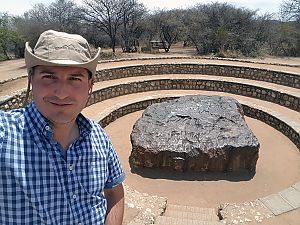Face to Face with: Dr. Ludovic Ferrière/NHM

The Natural History Museum Vienna (NHMW) is one of the largest, oldest and most important natural history museums in the world and, thanks to its wide range of scientific collections, the world-leading expertise of its dedicated scientists and its state-of-the-art laboratories, it is a recognized center for scientific research in a wide variety of fields.
The NHMW houses several (scientific) reference collections, including the oldest meteorite collection in the world, a large number of specimens of which are displayed in the Meteorite Hall, the largest meteorite exhibition in the world.
Dr. Ludovic Ferrière is responsible for this. He is the curator of the Meteorite Collection & the Impactite Collection at the Natural History Museum Vienna.
Ferrière is a geologist by training, his specialty being meteorites and their impact craters.
The French scientist developed an early interest in rocks and minerals. To fulfill his dream of gaining as much knowledge as possible about impact craters (and also to see many with his own eyes), he studied geology and planetology at various French, Canadian and Austrian universities, including the University of Vienna.
In 2011, he was hired at the Natural History Museum of Vienna as curator of the rock collection and co-curator of the meteorite collection. Currently, he is the chief curator of the NHMW's renowned meteorite collection and impactite collection. It is a position he cares for with heart and soul. Under his leadership, the entire meteorite hall of the museum, which incidentally houses the largest meteorite exhibition in the world, has been renovated, reorganized and modernized.
But this is not his only great success. Dr. Ludovic Ferrière was able to make a name for himself in expert circles with the discovery and confirmation of the Luizi impact crater in the Democratic Republic of Congo.

The French scientist is the best example that you don't have to fly to the stars to have a space career. There are many opportunities in the space sector. Ferrière advises children and young people who want to follow in his footsteps to specifically follow their own dreams. "It has never been more true than it is today, the future will not only be on Earth, but also in space. I always say 'Science is the religion of the 21st century.' Advances in science and technology have changed our lives, but also the world, and it's always better to be a part of it than to stand by like a spectator." Ludovic himself started honing his career when he was 13 years old.
Space has always interested the scientist. The "unknown," the lack of boundaries, the opportunity to learn and discover something new and different - according to Ferrière, space exploration is for and what ocean exploration was for our ancestors. Accordingly, in his eyes, the potential of the use of space is also great. The same applies to the Austrian "space". But in order to realize this 100%, more experts for space research, exploration of natural phenomena, astrobiologists and other scientists are needed. Ferrière is sure: Austria is already well established in industry and economy, but the research sector still needs support and young scientists. To the latter he advises: "Be passionate, curious and critical, and you will succeed!"
